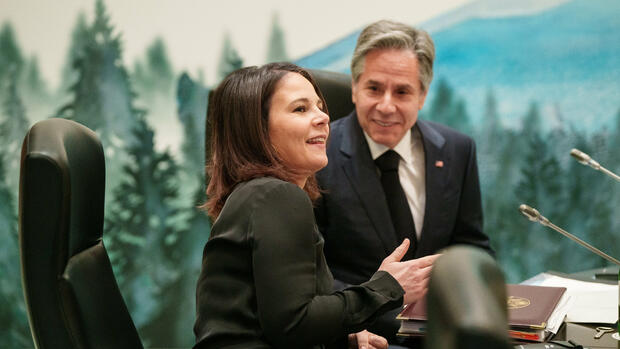Should an almost complete export ban be imposed, a large part of the remaining trade flows with Russia would collapse.
(Photo: dpa)
Japan The US and other key Ukraine allies are considering a total ban on most exports to Russia to increase economic pressure on President Vladimir Putin.
Diplomats are discussing the idea ahead of the May summit in Japan, according to people familiar with the matter. The aim is currently to win over the European Union. The proposal is still being discussed and is subject to change, it said.
The approach the diplomats are discussing would reverse the existing sanctions regime and ban all exports unless exempted, the people said. Under the current criteria, all exports are allowed unless sanctions are imposed.
Should G7 leaders approve the move, it would need to specify exactly which products would be exempt — most likely medicines and agricultural products, including food, it said.
But there are potentially serious obstacles to implementation. To come into force in the EU, the new criteria would need to be adopted by all member states, which would spark a heated debate given the likely backlash from companies still exporting goods to Russia and the risk of retaliation from Moscow.
>> Read also: G7 wants to become more economically independent of China
Should an almost complete export ban be imposed, much of the remaining trade flows between these countries and Russia would collapse. A spokesman for the US National Security Council declined to comment on the prospects of such a move.
So far, sanctions — ranging from electronics to luxury goods — have almost halved the value of EU and G7 exports to Russia. According to the Geneva-based Trade Data Monitor, goods worth $66 billion are still being imported into Russia from Europe, the US, Canada and Japan.
The G7 members see this as too great a benefit for Putin’s war economy, especially since Moscow is also finding ways to circumvent the sanctions and import goods via third countries.
Export ban could bring Russia even closer to China
Russia has reacted to the sanctions with its own export bans and temporarily interrupted energy supplies to Europe. The EU would be particularly vulnerable to restrictions on commodities such as copper. An almost complete embargo could also bring Moscow even closer to China in its search for alternatives.
Moscow no longer publishes import statistics, but some observers and governments continue to track exports to Russia. According to Trade Data Monitor, Germany, Italy and Poland are the three largest European exporters to Russia.
Among the G7 countries, products such as cars, chocolate, beer, shoes, flowers and make-up could be particularly affected. At the same time, European countries get some raw materials from Moscow, such as palladium, copper, iron and nickel.
More: Germany apparently continues to get Russian oil
